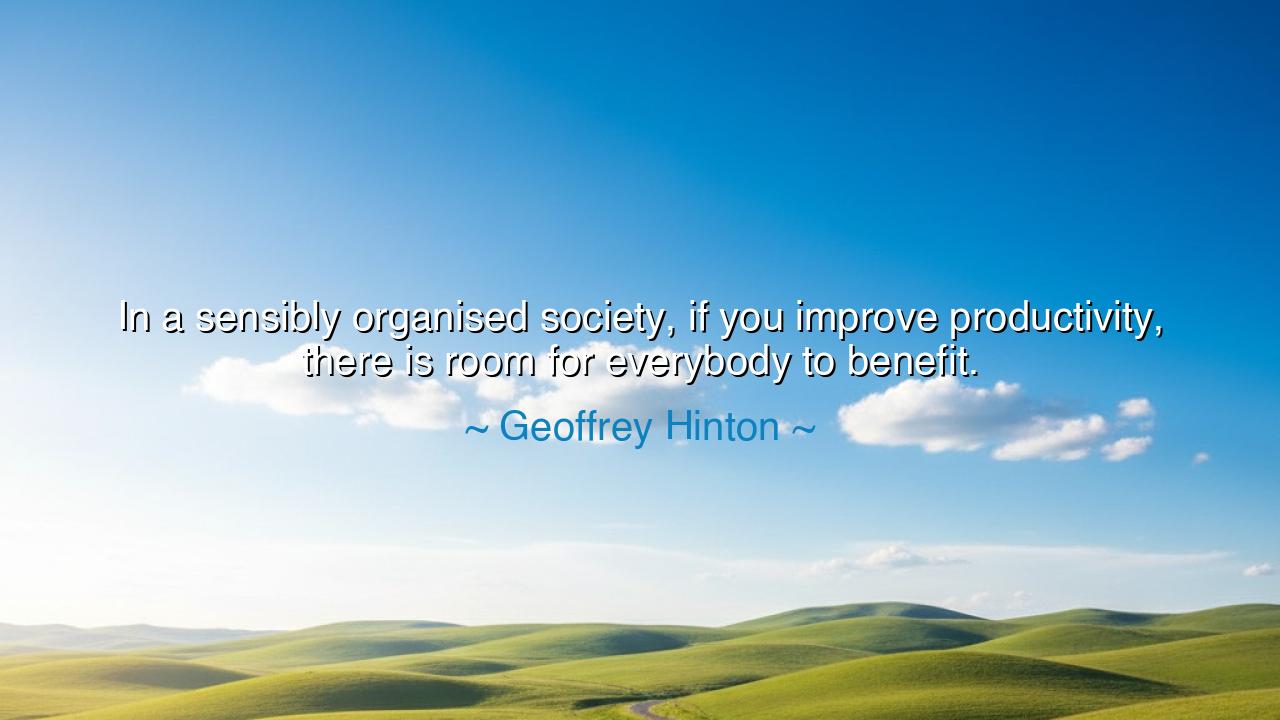
In a sensibly organised society, if you improve productivity
In a sensibly organised society, if you improve productivity, there is room for everybody to benefit.






Geoffrey Hinton, a seer of our age, proclaims with clear simplicity: “In a sensibly organised society, if you improve productivity, there is room for everybody to benefit.” These words shine like a beacon, reminding us that the wealth of human invention and labor was never meant for the few alone, but for the flourishing of the many. The ancients knew that the greatness of a city was not measured only by its walls or its armies, but by the way its abundance was shared among its people. For what is the use of progress, if it fattens only the powerful while leaving the poor hungry?
The heart of this saying lies in the marriage of productivity and justice. To improve productivity is to multiply the fruits of human effort, to draw more from the soil, the forge, the loom, or the machine. Yet, if society is not wisely arranged, these fruits rot in the storehouses of the few, while the many starve outside the gates. A sensibly organised society ensures that increase does not become oppression, but blessing. It ensures that every worker who toils in the field of progress tastes the harvest of their labor.
History bears witness to both wisdom and folly in this regard. In the dawn of the Industrial Revolution, factories filled with machines that multiplied output beyond imagination. Yet while productivity soared, many workers lived in misery—children in coal mines, families crammed into slums, laborers chained to endless hours. Here progress was not sensibly organized; it was squandered for the greed of the few. But in time, voices rose—unions, reformers, visionaries—who demanded that progress serve humanity, not exploit it. When laws were passed for fair wages, shorter hours, and safer conditions, productivity did not wither, but strengthened, for the people themselves became healthier, wiser, and more creative.
We can also look to the example of post-war societies in the twentieth century. In many nations, productivity grew as economies rebuilt. Where leaders chose wisely, investing in education, healthcare, and housing, the benefits of growth spread across the people. Whole generations rose from poverty to security, from ignorance to opportunity. Progress was not the prize of the elite, but the common inheritance of all. Such times revealed the truth of Hinton’s words: that there truly is room for everybody to benefit, if the structures of society are guided by fairness and foresight.
Yet the danger remains, even in our own age, where new machines—born of algorithms and artificial intelligence—promise wealth beyond measure. If organized without wisdom, such progress may widen the chasm between rich and poor. But if society is shaped with justice, these tools can become blessings, lifting burdens, spreading knowledge, and freeing human hands for greater works. The lesson of history and the warning of Hinton converge here: progress is a gift, but it must be governed by compassion and vision.
What then shall the listener learn from this? That every increase of productivity is a test of the society that receives it. Will we hoard, or will we share? Will we build walls, or will we open gates? In your own life, when you gain more—be it wealth, time, or knowledge—ask how you might let others benefit. In your community, demand systems that distribute the fruits of progress fairly, so that prosperity strengthens the whole, not just the summit.
So let the wisdom endure: “In a sensibly organised society, if you improve productivity, there is room for everybody to benefit.” This is not merely economics; it is morality, it is civilization itself. For the greatness of a people lies not in how high their towers rise, but in how deep their roots of justice grow. If progress becomes the treasure of all, then society becomes not only modern, but noble. And this, O listener, is the charge of every generation: to ensure that the light of progress shines on every face, and that none are left in shadow.






AAdministratorAdministrator
Welcome, honored guests. Please leave a comment, we will respond soon